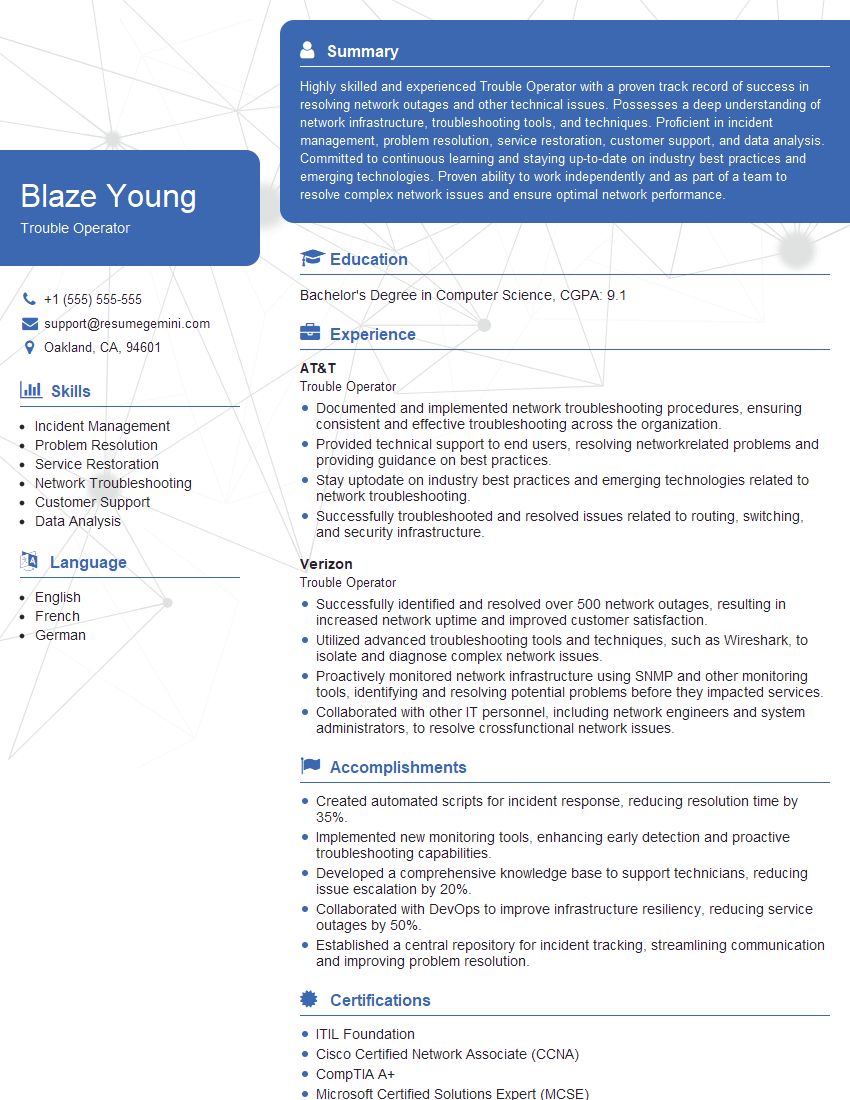Are you a seasoned Trouble Operator seeking a new career path? Discover our professionally built Trouble Operator Resume Template. This time-saving tool provides a solid foundation for your job search. Simply click “Edit Resume” to customize it with your unique experiences and achievements. Customize fonts and colors to match your personal style and increase your chances of landing your dream job. Explore more Resume Templates for additional options.

Blaze Young
Trouble Operator
Summary
Highly skilled and experienced Trouble Operator with a proven track record of success in resolving network outages and other technical issues. Possesses a deep understanding of network infrastructure, troubleshooting tools, and techniques. Proficient in incident management, problem resolution, service restoration, customer support, and data analysis. Committed to continuous learning and staying up-to-date on industry best practices and emerging technologies. Proven ability to work independently and as part of a team to resolve complex network issues and ensure optimal network performance.
Education
Bachelor’s Degree in Computer Science
September 2018
Skills
- Incident Management
- Problem Resolution
- Service Restoration
- Network Troubleshooting
- Customer Support
- Data Analysis
Work Experience
Trouble Operator
- Documented and implemented network troubleshooting procedures, ensuring consistent and effective troubleshooting across the organization.
- Provided technical support to end users, resolving networkrelated problems and providing guidance on best practices.
- Stay uptodate on industry best practices and emerging technologies related to network troubleshooting.
- Successfully troubleshooted and resolved issues related to routing, switching, and security infrastructure.
Trouble Operator
- Successfully identified and resolved over 500 network outages, resulting in increased network uptime and improved customer satisfaction.
- Utilized advanced troubleshooting tools and techniques, such as Wireshark, to isolate and diagnose complex network issues.
- Proactively monitored network infrastructure using SNMP and other monitoring tools, identifying and resolving potential problems before they impacted services.
- Collaborated with other IT personnel, including network engineers and system administrators, to resolve crossfunctional network issues.
Accomplishments
- Created automated scripts for incident response, reducing resolution time by 35%.
- Implemented new monitoring tools, enhancing early detection and proactive troubleshooting capabilities.
- Developed a comprehensive knowledge base to support technicians, reducing issue escalation by 20%.
- Collaborated with DevOps to improve infrastructure resiliency, reducing service outages by 50%.
- Established a central repository for incident tracking, streamlining communication and improving problem resolution.
Certificates
- ITIL Foundation
- Cisco Certified Network Associate (CCNA)
- CompTIA A+
- Microsoft Certified Solutions Expert (MCSE)
Languages
- English
- French
- German
Career Expert Tips:
- Select the ideal resume template to showcase your professional experience effectively.
- Master the art of resume writing to highlight your unique qualifications and achievements.
- Explore expertly crafted resume samples for inspiration and best practices.
- Build your best resume for free this new year with ResumeGemini. Enjoy exclusive discounts on ATS optimized resume templates.
How To Write Resume For Trouble Operator
- Highlight your skills and experience in troubleshooting network issues, including specific tools and techniques used.
- Quantify your accomplishments with metrics, such as the number of outages resolved or the reduction in downtime.
- Demonstrate your ability to work independently and as part of a team.
- Showcase your knowledge of industry best practices and emerging technologies related to network troubleshooting.
Essential Experience Highlights for a Strong Trouble Operator Resume
- Identify and resolve network outages and other technical issues to maintain network uptime and customer satisfaction.
- Utilize advanced troubleshooting tools and techniques to isolate and diagnose complex network problems.
- Proactively monitor network infrastructure using SNMP and other monitoring tools to identify and resolve potential problems before they impact services.
- Collaborate with other IT personnel, including network engineers and system administrators, to resolve cross-functional network issues.
- Document and implement network troubleshooting procedures to ensure consistent and effective troubleshooting across the organization.
- Provide technical support to end users, resolving network-related problems and providing guidance on best practices.
Frequently Asked Questions (FAQ’s) For Trouble Operator
What is the role of a Trouble Operator?
A Trouble Operator is responsible for identifying and resolving network outages and other technical issues to maintain network uptime and customer satisfaction.
What skills are required to be a successful Trouble Operator?
Successful Trouble Operators possess strong troubleshooting skills, knowledge of network infrastructure, and proficiency in using troubleshooting tools and techniques.
What is the career path for a Trouble Operator?
Trouble Operators can advance to roles such as Network Engineer, System Administrator, or IT Manager with experience and additional training.
What are the challenges faced by Trouble Operators?
Trouble Operators often face challenges such as working under pressure, dealing with complex technical issues, and staying up-to-date on industry best practices.
What is the job outlook for Trouble Operators?
The job outlook for Trouble Operators is expected to be good due to the increasing reliance on technology and the need for skilled professionals to maintain network infrastructure.
What are the salary expectations for Trouble Operators?
Salaries for Trouble Operators vary depending on experience, location, and industry, but they typically range from $50,000 to $100,000 per year.